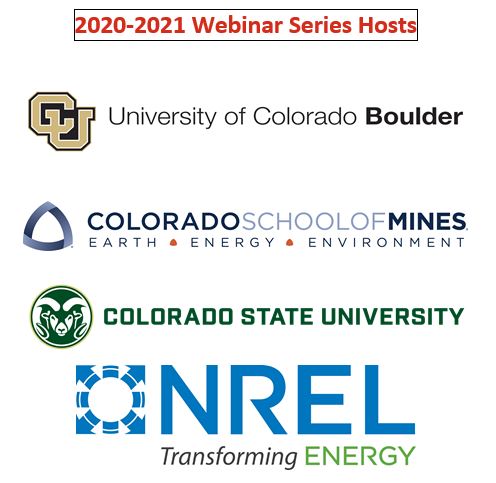The Power of Collaboration in Building Clean Energy Innovation Ecosystems
Webinar description: Anthropogenic climate change is real, and innovation is essential to creating our future energy system in which greenhouse gas emissions are close to zero. Innovation is needed to improve performance and drive down costs of existing clean-energy technologies, and serve as an engine for economic growth by creating the new technologies that will address the hard problems of sustainable industry, agriculture, infrastructure and transportation.
Great innovation requires global vision combined with regional actions linked to local social and economic priorities, workforce strengths and resource availability. The opportunity is here for the U.S. to leverage the full potential of its innovation ecosystems, by embracing the diversity of regional strengths and targeting federal and state planning accordingly.
This 60-minute session explored the diversity of regional clean energy efforts across the US, and zoom in on Colorado’s notable success in fostering a vibrant community of innovative clean energy start-up companies. The results illuminate how relatively modest funding can be effectively directed to grow state-level Clean Energy Innovation Systems that deliver clean-technology innovations to foster economic growth and deliver on social commitments to energy efficiency, clean energy and the environment.
Original air date: October 27, 2020
Cost: Free of charge but if you haven’t registered, please register here
Click here to watch re-posted video
Co-Hosts: Colorado Energy Research Collaboratory (energy research partnership between University of Colorado Boulder, Colorado School of Mines, Colorado State University, and National Renewable Energy Lab) and Center for the New Energy Economy and University of Maryland Earth System Science Interdisciplinary Center
Webinar host and for more info: [email protected] 970-682-5707 (cell/text)
Written reports referenced during webinar:
1) Ellen Williams’ report — Regional Energy Innovation Report
2) Ellen Williams’ report — Maryland Regional Report 2019-building a clean energy ecosystem
Fireside Chat Moderator: Bill Ritter, former Colorado Governor, Director, Center for the New Energy Economy, Colorado State University
Keynote speaker: Ellen Williams, Distinguished University Professor, Director, Earth Systems Science Interdisciplinary Center, University of Maryland
**************************************BIOS**********************************************
 Governor Bill Ritter Jr.
Governor Bill Ritter Jr.
Former Colorado Governor
Director, Center for the New Energy Economy
Colorado State University
Governor Bill Ritter was elected Colorado’s 41st governor in 2006 and was the District Attorney of Denver from 1993-2005. During his four-year term as Governor, Ritter established Colorado as a national and international leader in clean energy by building a New Energy Economy. After leaving the Governor’s Office, Ritter founded the Center for the New Energy Economy at Colorado State University, which works with state and federal policy makers to create clean energy policy throughout the country. Governor Ritter has authored a book that was published in 2016 entitled, Powering Forward – What Everyone Should Know About America’s Energy Revolution. Gov. Ritter was formerly the chair of the Board of Directors of the Energy Foundation and currently serves on the Regis University Board of Trustees. Gov. Ritter is a member of Blackhorn Venture Capital and serves as an advisor to Green Alpha and Millennium Bridge, among others. Ritter earned his bachelor’s degree in political science from Colorado State University (1978) and his law degree from the University of Colorado (1981). With his wife Jeannie, he operated a food distribution and nutrition center in Zambia. He then served as Denver’s district attorney from 1993 to January 2005.
Ellen D. Williams
Former ARPA-E Director
Distinguished University Professor
Director, Earth Systems Science Interdisciplinary Center
University of Maryland
Ellen Williams is a Distinguished University Professor and the Director of the Earth Systems Science Interdisciplinary Center (ESSIC) at the University of Maryland. She has been a member of the University of Maryland faculty since 1981, a period which included a leave of absence to work in industry and in government from 2010-2017. Before returning to the University in January of 2017, she served as the Director of the Advanced Research Projects Agency, ARPA-E, which advances high-potential, high-impact energy technologies that are too early for private-sector investment. Prior to Senate confirmation for her role in ARPA-E, Dr. Williams had been the Chief Scientist at BP (2010-2014), and a Distinguished University Professor in the Institute of Physical Science and Technology and the Department of Physics at the University of Maryland. At Maryland she established an internationally recognized research program in experimental surface science, exploring fundamental issues in statistical mechanics and nanotechnology. She founded and led the University’s interdisciplinary Materials Research Science and Engineering Center from 1996 through 2009. Since returning to campus in 2017, she has worked with colleagues in the College of Engineering and the School of Public Policy to advance technical innovation in the development use of clean energy. At ESSIC, she is responsible for a collaborative (NASA, NOAA and UMD) program of research involving in situ and remotely sensed observations with coupled ocean-atmosphere-land models to forecast changes in the global environment and the associated regional implications. Dr. Williams is a member of the National Academy of Sciences, the American Academy of Arts and Sciences, a foreign member of the Royal Society (London), and a fellow of the American Association for the Advancement of Science. She has a distinguished history of professional service, including chairing the development of the NAS report on Technical Issues for the Comprehensive Test Ban Treaty, and extensive work in providing technical advice to the U.S. government related to national security.


